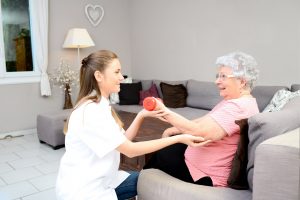Therapy
 Do you or someone you know suffer from aches, pains or difficulties doing every-day things? Poor posture and movement can have a big impact on your well-being and ability to live life to the full. We are here to help improve your quality of life. At Positive Positioning we offer 1:1 rehabilitation in your own home or a setting of your choice so you don’t need to travel to a clinic if you don’t want to.
Do you or someone you know suffer from aches, pains or difficulties doing every-day things? Poor posture and movement can have a big impact on your well-being and ability to live life to the full. We are here to help improve your quality of life. At Positive Positioning we offer 1:1 rehabilitation in your own home or a setting of your choice so you don’t need to travel to a clinic if you don’t want to.
Positive Positioning offers specialist physiotherapy and occupational therapy for clients with long-term conditions such as cerebral palsy, acquired brain injury, learning disabilities, stroke, multiple sclerosis, Parkinson’s etc.
As well as offering individual therapy sessions, we are also able to provide you with tailored exercise programmes, therapy support packages for your family/ personal assistants / support workers / carers to assist you with.
We can work with the staff at local leisure centres or gyms to ensure you have access to all the facilities you require. Our therapists will support you into other forms of physical activities appropriate to your needs and desires such as cycling, horse riding, snow sports, paddle sports etc.
Positive Positioning therapists are specialists in therapy equipment and are very happy to advise you and make recommendations. We can also book appointments with representatives from companies to bring equipment to try either at home or in a place of work to improve environment for you.
Appointments are flexible to suit your needs, please call to arrange a visit. If you are unsure if Positive Positioning can help you with your particular issue please call us for free confidential chat.
Click on any of the following services below for further information on how we can help you.
Positive Positioning therapists visit you in your home at an agreed date and time. We spend some time talking and understanding the challenges you face and will make notes as we go. This informs us what treatment approach is most suitable for you.
This forms part of the assessment and help the therapist build a picture of your abilities and challenges
After the assessment the therapist will discuss treatment goals with you and the length of time this would be expected to take. The treatment programme suggested by you therapist will be specific to you and tailored towards meeting the agreed therapy goals.
Functional exercises are specifically designed to train your muscles to work together to simulate common movements you might do at home, at work or in sports. While using various muscles in the upper and lower body at the same time, functional fitness exercises also emphasise core stability, improves balance and function.
More information coming soon.
Positive Positioning therapists may advise you on specialist equipment to make some tasks easier for you. This could be for managing posture in sitting or lying, daily tasks or orthotics. We do not supply equipment and may invite representatives form companies who do supply specific equipment to come and show you so you can try it where appropriate.
We are proud to be delivering Hydrotherapy training to Leeds Adult Care staff to enable them to support people into the hydrotherapy pool at Holt Park Active. For more information please contact us. Read more >>
Positive Positioning works with Leeds Continuing Health Care (CHC) to provide Manual Handling training to carers and Personal Assistants (PAs) in the home they work in. This allow us to train specifically in the equipment used in that environment and with that individual. This service is not exclusive to CHC please contact us for more information.
More information coming soon.
More information coming soon.
More information coming soon.
More information coming soon.
More information coming soon.
More information coming soon.



